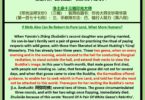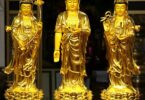[103] How I Did My Best To Guide My Mother To The Best Rebirth
我如何尽力引导母亲得到最好的往生
It was the first day of Chinese New Year in 1999. After visiting my in-laws, we went to my mother’s house. What greeted us was the sleepy and frowning face of my youngest sister who lived with my mother. My instincts told me something has happened…
In the middle of the night, my sister heard a loud thud from my mother’s bedroom. She rushed over to find her lying on the floor in a semi-conscious state. An ambulance sent her to Singapore General Hospital’s (SGH) A&E department. Results from a scan and x-ray showed that beyond the hairline crack on her backbone from a previous fall, there was also a large mass in the abdomen area. The doctor has diagnosed that it was the terminal stage of colon cancer, with three months more to live.
This was a great blow to me and my siblings (i.e. my five brothers and six sisters). All we wanted to do was to be by her side immediately. Upon arriving, we were told that she is unconscious but stable. We felt so helpless then. It gradually dawned upon me to chant ‘Námó Guānshìyīn Púsà’ (南无观世音菩萨: Homage to and refuge for life in Contemplator Of The World’s Sounds Bodhisattva) when I remembered that my mother was a strong believer in the Bodhisattva. After some discussion with my sisters, we agreed to take turns to pair up, to do the chanting, with the rest waiting at the seating area. We knelt beside her bed and chanted continuously till daybreak.
[Note 1: Ideally, there should be offering of guidance (开示) before offering support-chanting (助念). Guidance text (开示文) can be seen at https://purelanders.com/wake:
临终者的开示
(依情况,可略过括号中的文字。)「亲爱的 ___ [临终者名],您已经为了家人、朋友和社会,做了许多贡献,就好比 _____ [列出一些杰出的善行]。我们将继续以您的名义,为您行善造功德。所以,您应该随喜功德而安心。既然您将要离开,现在就要放下【您的执着,如】家庭、财富、地位,【或所厌恶的,如】疼痛、遗憾、怨恨、恐惧,因为这些妄想都帮不了您,也只会干扰您。现在最能利益自己和您所爱的人的,就是真诚地跟我们一起念佛。这样就可以往生到阿弥陀佛的净土。那里没有痛苦,只有安乐。别担心您不够清净。只要您现在诚心悔过,阿弥陀佛一定会慈悲接引您。即使是犯过大错的人,一旦忏悔,而真诚念佛,也可以往生净土。(念《忏悔文》后),请随着我们的念佛,轻声跟着念,或在心中默念。只要全心全意念佛,您一定会看到阿弥陀佛来接引您到他的净土。请只跟着阿弥陀佛去,而别跟随其他人。请别担心您的家人,因为他们都会安好。将来他们也会念佛往生净土,与您见面。让我们现在用最真诚的心念。」
Guidance To The Dying Person
(Depending on the situation, the text in brackets can be skipped.) ‘Dearest ___ [name of dying person], you have done much good already, having done _____ [list some outstanding good deeds] for your family, friends and society. And we will continue to do more good in your name to create merits for you. For this, you should rejoice and have peace of mind. As you are about to depart, it is time to stop thinking about [your attachments such as] family, wealth, status, [or your aversions such as] pain, regrets, grudges and fears, as these thoughts cannot help you now, and can only disturb you. The best thing you can do for yourself and your loved ones is to Niànfó with us sincerely now, so that you can reach Āmítuófó’s Pure Land – where there is no more suffering, where there is only bliss. Do not worry that you are not pure enough, for Āmítuófó is compassionate and will receive you if you wish to be a better person from now on. Even those who had made great mistakes but repent can reach Pure Land by sincere Niànfó. (After reciting the Repentance Verse), please follow our Niànfó and chant along softly, or in your mind. Focusing only on the name of Āmítuófó wholeheartedly, you will definitely see Āmítuófó come to guide you to his Pure Land. Please follow only Āmítuófó and no one else. Please do not worry about your loved ones, as they will be fine. They too will Niànfó to reach Pure Land when it is time to meet you there. Let us now most sincerely recite.’
[Note 2: Creating and sticking to a shift system for sustainable support-chanting till recovery, or till three to eight hours after departure is good.]
She eventually gained consciousness when I visited her the next day. She was conscious and looked happy. She said she saw the Bodhisattva in a male form sitting on a lotus. I told her that the Bodhisattva can be in many forms. She said that she was trying to catch up when the lotus moved upwards, while she was not able to. When I asked her why, she said the chanting was too fast for her to follow. She then woke up. I asked if she will follow the Bodhisattva if she appears again. Without hesitation, she said she will. I encouraged her to chant a simpler and shorter chant, which is the name of Āmítuófó (阿弥陀佛). We got her a Buddha recitation device (念佛机) for guiding her too.
[Note 3: As there was mindfulness of the Bodhisattva, the one seen was thus the Bodhisattva, and recognisable as so, despite being in another form.]
[Note 4: Support-chanting should always be at a moderate speed, especially for those not familiar with chanting by themselves without guided chanting. If there is personal chanting at one’s preferred speed, there can still be connection.]
[Note 5: Indeed, Āmítuófó’s name is easier to chant and focus upon due to its brevity.]
[Note 6: While playing of a guiding track is useful as a reminder to chant, be it verbally or only mentally, there still has to be personal sincere chanting and sincere listening to the chanting, to connect to the Buddha (or Bodhisattva). ‘Live’ support-chanting creates meritorious virtues and offers protection too, while mechanical chanting being played does not.]
A week later, she was transferred to Dover Park Hospice. During the stay, she was always dozing off because of morphine, unable to do chanting. We prayed very earnestly that she would wake up and talk to us again. Miraculously, after slightly more than a month, she became very awake and sat up on the bed. She insisted on going for a walk to have some fresh air outdoors. We brought her to a garden outside the ward and sat under the sun. There, she expressed her wish to return home. We immediately made arrangements with the hospice to rent a hospital bed, wheelchair and ambulance to assist her transfer home. We also engaged a day nurse to administer her morphine dosage and daily feed through a tube.
[Note 7: Painkillers that cause drowsiness should be minimised in use, so that there can be more mindful chanting. Even with the patient drowsy or mostly ‘sleeping’, there should be continual offering of guidance and support-chanting, to let Āmítuófó’s name seep into the mind, to facilitate swifter connection for smooth departure. There should be reasonable time reserved for natural sleep, but still with softer support-chanting, in case there is sudden departure.]
[Note 8: The sudden waking, that might be mistaken as ‘full recovery’ should be the near final burst of energy being expressed.]
As she was conscious, we took the opportunity to invite the monastic through whom she took the Threefold Refuge (三皈依) to chant the Amitābha Sūtra《阿弥陀经》. Into the final week, she pulled out her nose tube several times to take her food orally. Each time, my sister-in-law, who was a nurse, helped to put it back. She also warned us that colon cancer patients’ stomachs might swell to be bloated. Thank Āmítuófó, this did not happen.
[Note 9: As death was approaching, there should be focus on offering guidance and support-chanting using Āmítuófó’s name only. While chanting the sūtra creates meritorious virtues (功德), if the teachings are not explained to the dying person, there is no actual guidance shared. It is thus better to offer summarised guidance, before offering support-chanting, which also creates great meritorious virtues, that facilitates connecting to Āmítuófó directly.]
A day before her passing, which was a Sunday (10th of May), we celebrated Mother’s Day with a cake for her, (as in the picture above). She was in good spirits. After dinner, she requested to take a proper bath in the bathroom. I shampooed and washed her hair while a sister soaped and bathed her.
[Note 10: If there is certainty that death is imminent, it is safer to quickly express gratitude together, and resume with offering of guidance and support-chanting. This is so in case celebrations cause attachment to the life that is about to expire, while forgetting the goal of reaching Pure Land.
[Note 11: If the patient is weak and/or in pain, truly in the last phase of dying, there should not be cleaning up, as touching and moving will cause magnified pain due to increased sensitivity.]
The next day, after lunch, my sister noticed that her breathing was heavy. Loud unusual noises could be heard. She called for an ambulance and my mother was admitted to SGH again. The doctor told my sister that she will not live through that night. Upon knowing this, she reached out to all of us, asking us to visit immediately.
When I opened the door to the ward, I saw my mother unconscious on the bed. My surrounding siblings were all silent. I asked if they helped her to chant. They replied that they did so earlier. I quickly went to her bedside and held the beads on her wrist, chanting ‘Námó Āmítuófó’ (南无阿弥陀佛). Immediately after chanting one round of the beads, her head tilted to her left, with a last gasp of air, as the machine monitoring her heartbeat showed a straight line —— Her final expression was peaceful, as if she was sleeping. (We continued chanting for about two hours after.) Āmítuófó.
[Note 12: There should be continual offering of guidance and support-chanting from the dying phase to three to eight hours after death, as this is the most crucial period for connecting to Āmítuófó.]
[Note 13: As above in Note 11, ‘If the patient is… truly in the last phase of dying… touching and moving will cause magnified pain due to increased sensitivity.’ Although it is natural to wish to express care by holding the hand of the dying and such, this should not be done. There is no need to use the beads to chant, what more those on the dying person.]
[Note 14: There should be chanting of ‘Āmítuófó’ only, especially in the last phase of dying. As in Note 5, ‘Āmítuófó’s name is easier to chant and focus upon due to its brevity.’ As long as there is sincerity, which expresses homage and refuge, omitting ‘Námó’ (南无) is alright.]
[Note 15: This case is remarkable because although before more complete learning of how to offer guidance and support-chanting, ‘The Three Great Essentials When Approaching Death’《临终三大要》were still to carried out to some extent, but with room for improvement. In summary, the essentials are –

(1) First, skilfully inspire, guide and console the dying person, to enable giving rise to right Faith. (第一,善巧开导安慰,令生正信。) (2) Second, everyone should take shifts to recite the name of Buddha [Āmítuófó], so as to support pure mindfulness. (第二,大家换班念佛,以助净念。) (3) Third, you must avoid [touching or] moving the body and crying, so as to prevent bungling the matter [of reaching Pure Land]. (第三,切戒搬动哭泣,以防误事。) For more details, see https://purelanders.com/now.]
Námó Āmítuófó : Joyce Teo
20 May 2023
相关教理
Related Teachings:
死亡前后与丧礼中后的诵念
Chanting When Dying, After Death, During And After Wakes
https://purelanders.com/wake
《临终三大要》: 原文·白话·详解
The Three Great Essentials When Approaching Death: Original, Simplified And Explanatory Text
https://purelanders.com/now






